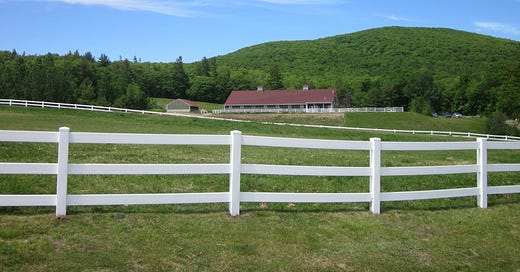Trying to Close the Door Behind Them: A Not So Common Good Story
Coercing others through government intervention while asserting moral superiority reveals self-deception, not moral virtue.
We began Session 3: There is No Common Good of our study of The Road to Serfdom on Saturday. This post provides a supplemental example.
In the pre-Internet era, newspapers and the nightly news were the primary news sources.
Roughly thirty-five years ago, my phone started ringing incessantly on a Sunday at 7:00 AM.
The Sunday Baltimore Sun's opinion section featured my essay "Trying to Close the Door Behind Them.” In that era, Sunday newspapers were weighty, and people would spend a portion of the day reading them.
Howard County, Maryland, located between Baltimore and Washington, D.C., has become part of a massive megalopolis. During that period, Howard County still retained a distinctly rural atmosphere in certain regions. At that time, farmers were making efforts to sell their land to housing developers. The demand for housing was great, and some of these landowners were eager to retire following a lifetime of dedication to farming.
The only wrinkle was that many residents of Howard County who had already bought their homes were trying to block these land sales. Their primary motivation was self-serving, as limiting the supply of new homes would boost the value of their own. Of course, they didn't admit to any of this. Instead, they argued they were fighting to preserve the county's character and environment. Never mind that the construction of their homes had already altered the character and environment of the county. Proclaimed good intentions are meaningless.
Two phone calls from that morning stuck in my mind. One call came from an emotional farmer who appreciated me advocating for farmers. According to him, their interests were wholly disregarded in the news coverage. The farmer was prepared to retire but would have a meager retirement without selling his land.
The second was an anonymous caller threatening my death if I didn’t stand down. What made that call chilling was the voice sounded just like a well-known Howard County politician I had heard on the news. Of course, I had no way to know for sure. In that era, there was no caller ID.
I've repeatedly written about the local farmers in our rural New Hampshire community who provide us abundant outstanding produce from May through November.
At this time, a farmer is spearheading a campaign to oppose a proposal for a hotel to be built on farmland just a mile away from his own farm. Commercial development in this rural town is concentrated along a single highway strip; the new hotel would be located there. The farmer selling the land is likely capitalizing on its location and increasing demand for development.
During a recent fall color day, in just 15 minutes, my wife and I observed car license plates from more than 20 states in a nearby town. Development is driven not just by tourism but also by people looking to escape dystopian cities.
The farmer opposing development is urging residents to utilize the town's planning board process to stop the commercial development and protect the proclaimed community's character.
I couldn't help but think of Howard County many decades ago.
It's common to mistake our interests for the shared interests of the common good. No matter how well-meaning, I doubt whether the opposing farmer is taking into account the best interests of the other farmer who is trying to sell his land.
If development is effectively blocked, what do they think the landowner should do with the farmland he is trying to sell? Is he still responsible for paying taxes on it? Are they ready to provide the landowner with voluntary contributions to compensate for the income he would forfeit by not selling the land? If the opposing farmer’s stance is to maintain the land as agricultural property, why not mobilize the community to buy the land? If local residents do not buy the land, will they offer volunteer labor to the farmer or contribute to his retirement?
These questions are rhetorical. Getting the community to buy the land would be extremely challenging while having the government block development would be much simpler.
The farmer opposing development doesn't consider the impact a new hotel would have on the restaurants and shops that line this town's quintessential New England town’s Main Street. Opening a new hotel would benefit Main Street business owners and their employees.
The time will come when the opposing farmer reaches retirement age and perhaps takes a different stance to ensure their future.
Due to the mountainous terrain, the presence of the National Forest, and frigid winters, this area will likely remain a sparsely populated, rural community.
Humans naturally prioritize their own special interests. Yet, coercing others through government intervention while asserting moral superiority reveals self-deception, not moral virtue.
The government still has a role to play, but we should be cautious of those who exploit its power for personal interests.
My point is one Hayek argued: Measuring the common interest on a single scale is impossible.
This week, continue to comment on chapter 5 of The Road to Serfdom.
Beginning on Saturday, we will examine more closely what Hayek means by the Rule of Law and, thus, the positive role of government.
A reader recently honored me with this note: “That was a fantastic column, Barry. You consistently take me on a path that encourages me to think for myself, to do the right thing, and to live the kind of life I know I’m supposed to live. Surrounding myself with people like yourself and Bari Weiss gives me great hope. Thank you so much for what you do."
If my essays make a difference for you, I hope you join Martin in supporting this Substack. Your paid subscription helps make these essays possible and gives you immediate access to Mindset Shifts U. Thank you.






California banned plastic bags…The Nobel Prize winning economist FA Hayek once observed that the “curious task of economics is to demonstrate to men how little they really know about what they imagine they can design.”
It’s a phrase that comes to mind watching California lawmakers double down on its ban on plastic grocery bags, a policy lawmakers passed ten years ago and today admit failed. They also banned plastic straws. Politicians and their advisers are obtuse!
Humans naturally prioritize their own special interests. Yet, coercing others through government intervention while asserting moral superiority reveals self-deception, not moral virtue.
This paragraph made me think of the current government push to class anything that doesn't prioritise their own interests as mis-dis-information. Also the use of propaganda to make people unconsciously accept the governments own interests as their own. Hayek brilliantly had much to say about this in Chapter 11 The End Of Truth.